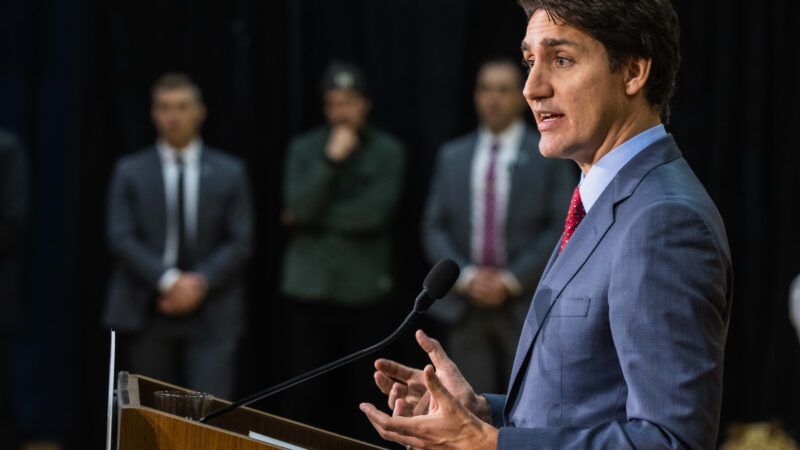Canada Welcomes the New Year by Banning Foreign Home Ownership
Taxes and bans on foreign home ownership haven't arrested home price increases where they've been tried. There's no reason to think Canada's policy will be more successful.

The Canadian government is welcoming the New Year by giving foreigners the cold shoulder. On Sunday, a new law went into effect banning noncitizens, nonpermanent residents, and foreign corporations from buying homes and condos in the country.
It's a fulfillment of Liberal Prime Minister Justin Trudeau's campaign trail promise to combat the allegedly rampant real estate speculation that's driving up home prices for ordinary Canadians.
"The desirability of Canadian homes is attracting profiteers, wealthy corporations, and foreign investors," said the Liberal Party's campaign website last year, noted CNN. "Homes are for people, not investors."
The policy was later folded into the government's budget proposal in April 2022. "We will make sure that houses are being used as homes, rather than as commodities to be traded," said Chrystia Freeland, Canada's finance minister, at the time.
It's certainly true Canada has some of the most unaffordable housing prices in the developed world. Average home prices are ten times average incomes. Compare that to the U.S., where median home prices are 4.3 times median incomes, per National Association of Realtors' data. OECD figures show that Canadian home prices have grown 43 percent faster than incomes since 2015.
And as homes have gotten more expensive, foreign homebuyers have become an increasingly popular scapegoat.
All three major political parties in Canada have endorsed efforts to limit non-Canadian home purchases. The Liberals and Conservatives both endorsed the ban that is now in effect. The left-wing New Democrats suggested a hefty tax on foreign purchases.
The idea behind the policy is that by reducing foreigners' housing demand, there will be more supply at more affordable prices for native Canadians. (Permanent residents and refugees are also exempted from the ban.)
The evidence suggests the effects of the new policy will be limited.
For starters, foreign buyers make up only 5 percent of homeowners in the country. Squeezing out such a marginal part of the market probably won't have a huge effect on prices.
Foreign buyers made up around 4 percent of New Zealand's housing market when the country implemented a ban on nonnative buyers in 2018. Home price growth continued unabated after the ban.
A heavy tax on foreign home purchases in British Columbia has managed to reduce "foreign-related" purchases from 10 percent of all sales to between 1 to 2 percent. One study of the policy showed it reduced home price growth by 1 percent, and that minimal benefit faded after a few months.
Such are the pitfalls of trying to marginally curb demand in a hot market without enough supply. Behind every eliminated foreign buyer are multiple domestic home purchasers competing over an insufficient stock of homes.
Canada's national housing finance agency estimates the country will be short some 3.5 million homes by the end of the decade. That's within spitting distance of the U.S.'s own estimated shortage of 4 million homes—a country with nearly ten times Canada's population.
The country has all the limits on supply that the U.S. does, including density restrictions in the urban core and growth boundaries on the exurban fringe. Both prevent new housing from being built to meet demand. As a result, prices in the country stay stubbornly high.
Canada's local and provincial governments are starting to address this problem with proposals to loosen zoning restrictions. Done right, that will unleash developers' ability to add much-needed supply.
At the federal level, it appears more politically practical to run with unproductive bans and to scapegoat foreigners.
Rent Free is a weekly newsletter from Christian Britschgi on urbanism and the fight for less regulation, more housing, more property rights, and more freedom in America's cities.


Show Comments (60)